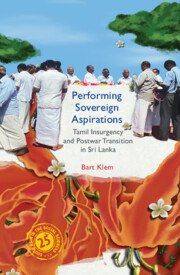Book contents
- Frontmatter
- Dedication
- Contents
- List of Illustrations
- Acknowledgements
- A Typographical Note on Separatism
- List of Abbreviations
- 1 Introduction
- 2 Sovereignty, Performativity and Tamil Nationalism in Sri Lanka
- 3 Performing an Insurgent Sovereign Experiment
- 4 Reconstituting ‘Pure Tamil Space’ after Sovereign Erasure
- 5 The Bureaucratic Evolution of Devolution
- 6 Tamil Nationalist Anti-politics in the Wake of Defeat
- 7 Conclusion
- Epilogue
- Glossary
- References
- Index
5 - The Bureaucratic Evolution of Devolution
Published online by Cambridge University Press: 30 April 2024
- Frontmatter
- Dedication
- Contents
- List of Illustrations
- Acknowledgements
- A Typographical Note on Separatism
- List of Abbreviations
- 1 Introduction
- 2 Sovereignty, Performativity and Tamil Nationalism in Sri Lanka
- 3 Performing an Insurgent Sovereign Experiment
- 4 Reconstituting ‘Pure Tamil Space’ after Sovereign Erasure
- 5 The Bureaucratic Evolution of Devolution
- 6 Tamil Nationalist Anti-politics in the Wake of Defeat
- 7 Conclusion
- Epilogue
- Glossary
- References
- Index
Summary
With the defeat of the Liberation Tigers of Tamil Eelam (LTTE), the experiment of establishing a de facto Tamil state had been violently erased. However, this was not the only institutional form created in pursuit of Tamil self-government. It had been dominant in the 1990s and 2000s, but there was a parallel institutional experiment, one that was premised on power-sharing within the framework of the Sri Lankan state: the North-Eastern Provincial Council (NEPC). The NEPC was created through the 1980s peace accord enforced by India, but it is part of a longer sequence of contested experiments with ethnic power-sharing in Sri Lanka, which dates to late colonial times and which continues to evolve. The central principle of these efforts is the devolution of government power from Colombo to sub-national levels. Ironically, the NEPC comprises an arrangement that none of the protagonists wanted, but which has nonetheless survived.
While the first part of this chapter takes stock of the NEPC's turbulent history, I will mainly focus on the postwar dynamics, when the council outlived the LTTE and emerged as the only remaining institutional legacy for some semblance of a Tamil government. My analysis zooms in on the day-to-day work of provincial bureaucrats. In a book about the grand historical themes of Tamil nationalism and Sri Lanka's civil war, it may seem unnecessary to become engrossed in bureaucratic processes, technical memos and departmental hierarchies. However, as I will elaborate in this chapter, the calm orderliness of the civil service and the turbulent conflict dynamics that engulfed provincial councils are not divorced realities. Civil servants enact the state, and the enactment of the state sits at the very heart of Sri Lanka's ethno-political conflict. The everyday work of neatly dressed bureaucrats with their paperwork, procedures and protocol, their tidy offices and stiff hierarchies (Photograph 5.1) is part of the same historical trajectory as the civil war and its aftermath.
There is valuable scholarship about what Sri Lanka's provincial councils could or should be doing, based on a diagnosis of the constitutional arrangements and governance structure (Coomaraswamy 2003; Rupesinghe 2006; Welikala 2012a).
- Type
- Chapter
- Information
- Performing Sovereign AspirationsTamil Insurgency and Postwar Transition in Sri Lanka, pp. 100 - 126Publisher: Cambridge University PressPrint publication year: 2024
- Creative Commons
- This content is Open Access and distributed under the terms of the Creative Commons Attribution licence CC-BY-NC 4.0 https://creativecommons.org/cclicenses/

